WordPress has been the most popular content management system (CMS) for over a decade. However, some people speculate that WordPress may be dying or losing popularity. Is WordPress dying? Let’s analyze the facts about WordPress in 2024 to uncover the future of this powerful CMS.
A Brief History of WordPress

To understand WordPress’ future, we should first understand its past.
WordPress was created in 2003 by Matt Mullenweg and Mike Little. The initial version focused on blogging features. Over the years, WordPress evolved into a full-fledged CMS with capabilities like:
- Custom themes and plugins
- E-commerce features
- Advanced custom fields
- Detailed user roles and permissions
- Intuitive admin dashboard
- SEO enhancements
With these robust features, WordPress gained rapid adoption. Here are some key WordPress milestones:
- 2003 – First WordPress release
- 2005 – WordPress.com hosted platform launched
- 2010 – Over 22% market share, beating closest rival Joomla
- 2013 – WordPress powers over 20% of all websites
- 2021 – Powers over 40% of all websites
- 2024 – Let’s dive into this discussion
This meteoric growth proves WordPress’ immense popularity over the years. The proven CMS has stood the test of time.
Is WordPress Usage and Adoption Declining?
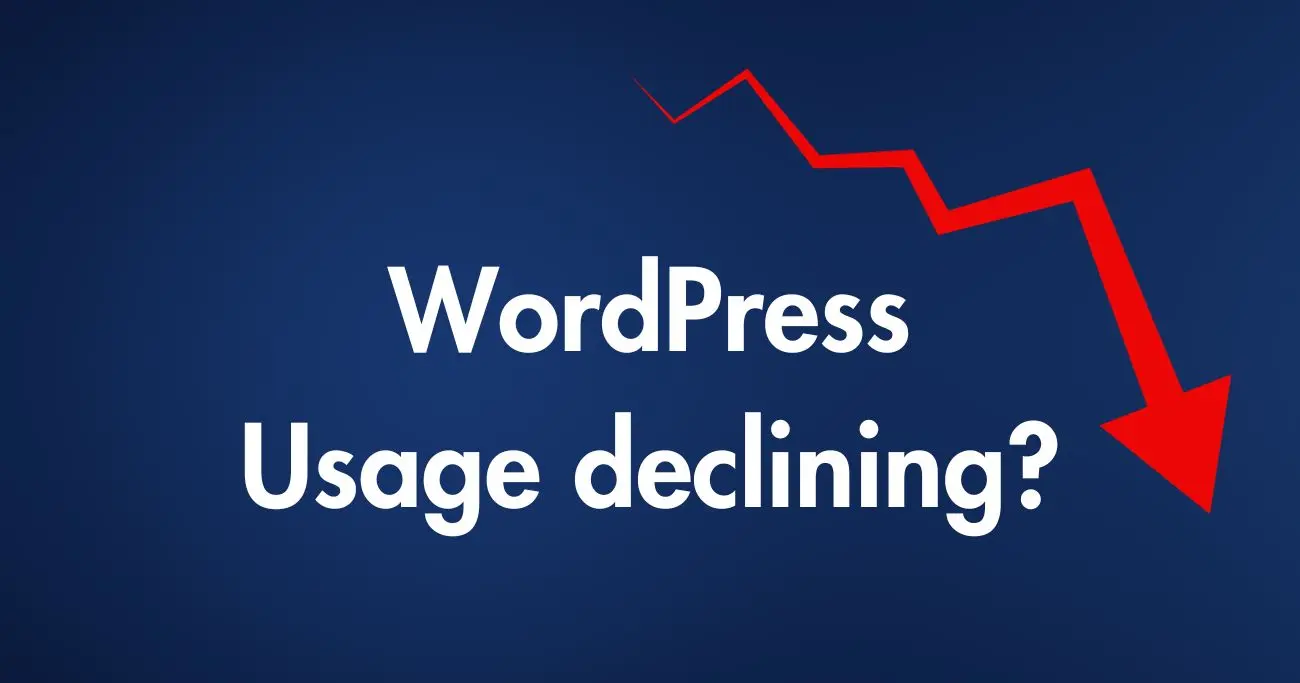
Some naysayers speculate WordPress adoption is dropping and fewer people are using it. Is this true? The numbers indicate the opposite – WordPress usage continues to grow steadily:
- WordPress powers over 43% of all websites, up from 40% in 2021.
- Over 477 million websites use WordPress worldwide.
- It has over 70 million downloads of its software.
- Over 11,000 plugins and themes are added every month.
- Used by top brands like Microsoft, NASA, Tesla, etc.
These statistics make it clear – WordPress is still the dominant CMS in the market. More sites continue to adopt it due to the flexibility and ease of use. There are no signs of slowing down.
Google Search Interest in WordPress Remains High
Some claim that interest and searches for WordPress are declining – implying lower adoption. But this Google Trends shows it’s untrue.
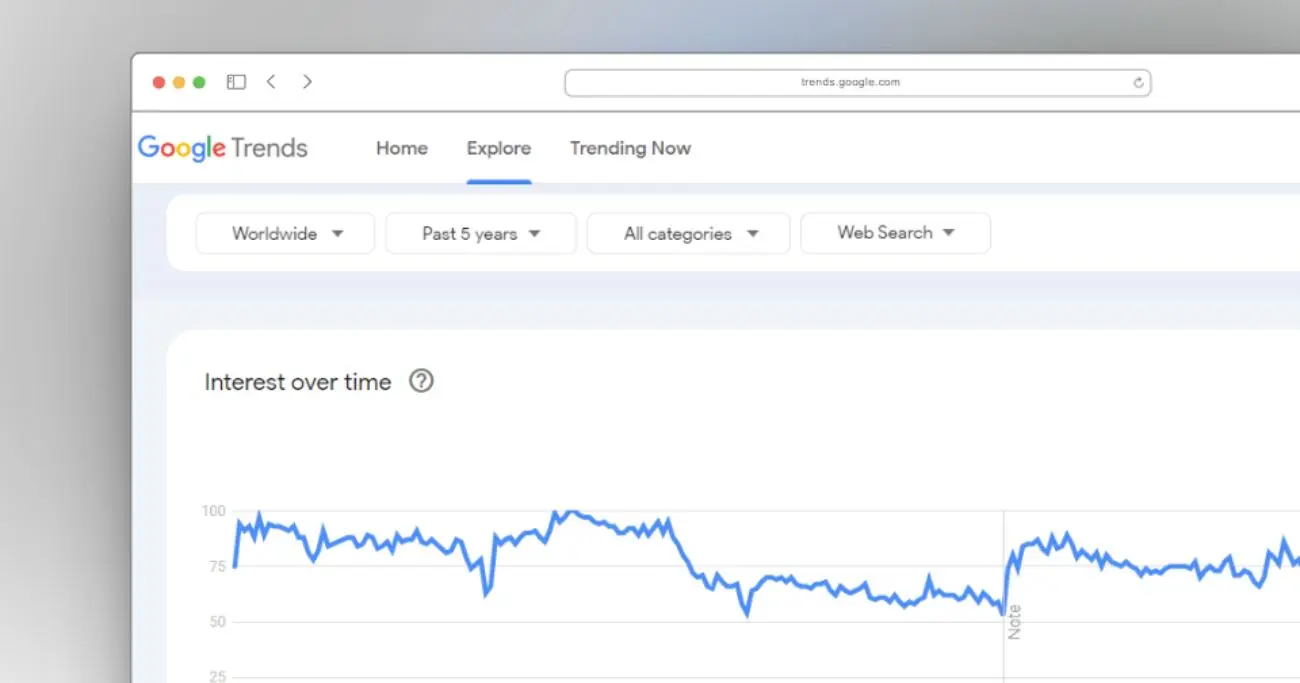
Worldwide Google searches for WordPress have remained remarkably consistent over this period. There was a slight dip in 2020-21 likely due to impacts of the COVID-19 pandemic.
However, interest recovered by mid-2021. It continues to exhibit a cyclical pattern with regular highs and lows, but no systemic downward trend.
By country, Pakistan generates the most searches related to WordPress, followed by Bangladesh, China, and Estonia. The CMS maintains strong interest both in Asian countries as well as in Europe and North America.
This data validates that WordPress remains top-of-mind for people globally wanting to create, modify or troubleshoot websites. There is no evidence of declining interest among users and developers.
Sustained Google search volumes over many years align with the continued growth in WordPress adoption worldwide. As long as people keep looking for WordPress-related information online, its future seems secure.
The key points regarding WordPress’ sustained dominance and growth remain unchanged. This is the clear answer to everyone who had a question in mind “Is WordPress dying?” and this search trends data provides additional evidence debunking claims of WordPress “dying” anytime soon. The open-source CMS continues going from strength to strength worldwide.
Why Does WordPress Continue to Grow?
There are several reasons for WordPress’ continued growth and popularity:
- Open source – Free for anyone to use and modify
- Ease of use – Intuitive interface and setup make it beginner-friendly
- Flexibility – Supports custom plugins, themes, fields, and modifications for advanced users
- SEO friendly – Built-in SEO enhancements help content rank better
- Robust features – Packed with all essential website-building tools
- Scalability – Can power blogs to enterprise websites smoothly
- Security – Regular updates and patches to fix vulnerabilities
- Support – Vibrant community forums provide assistance when needed
- Popularity – Benefits from network effects making it the default choice
As long as WordPress continues innovating in these areas, its leading position seems unchallenged. The CMS brings the perfect blend of simplicity and customizability – appealing to beginners and veterans alike.
Does WordPress Have Challenges to Address?
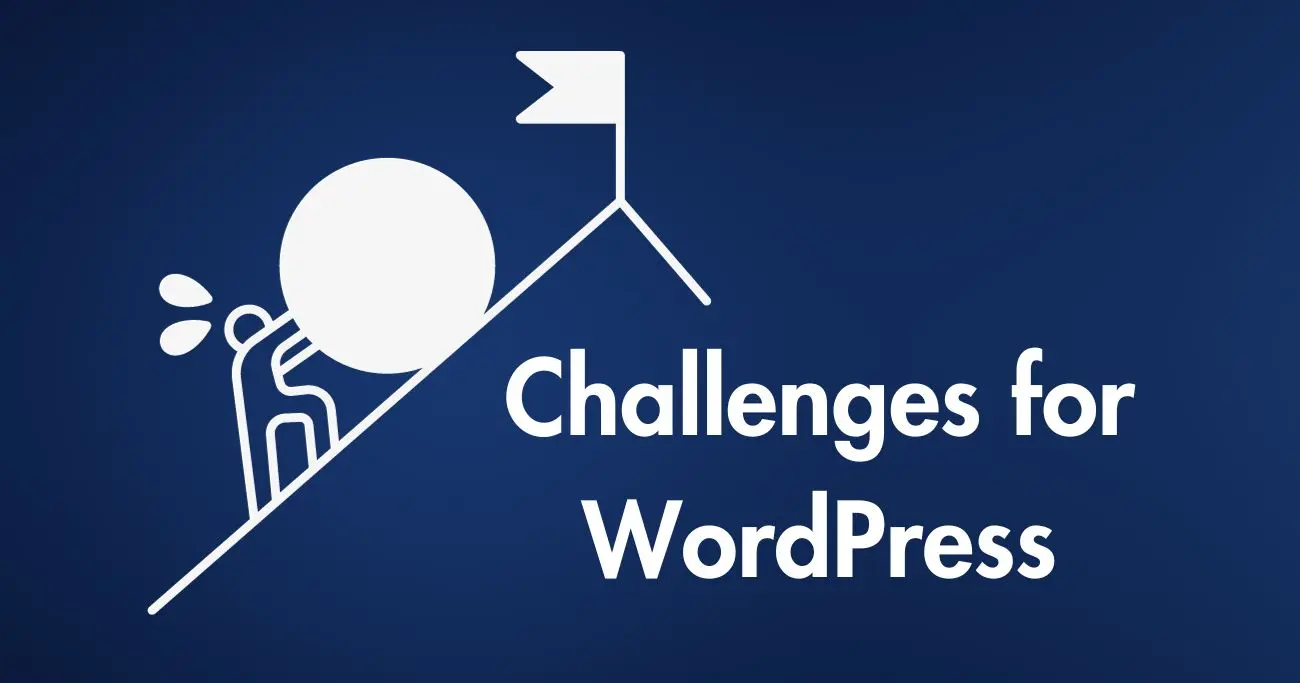
While WordPress is going strong, it does face some challenges and criticisms. Addressing these can help cement its continued dominance. Some common concerns raised include:
Performance and Speed
With heavy use of databases and dynamic pages, WordPress sites can suffer speed and performance issues. This hurts site visitor experience and SEO.
However, many optimization techniques like caching, CDNs, image compression, lazy loading, etc. can dramatically improve WordPress speed. Proper hosting and development choices also impact performance.
Security Vulnerabilities
Being open source, WordPress does suffer security issues from time to time. Hackers often exploit these to target WordPress sites.
However the WordPress core team is dedicated to patching vulnerabilities quickly. Adopting latest versions and hardening sites with security plugins and applying some best practices can make WordPress very secure. Most issues arise from outdated software or weak passwords.
Limitations for Advanced Users
WordPress offers tremendous flexibility for developers via hooks, plugins etc. But some advanced developers may find it restrictive compared to custom coding.
However, WordPress can integrate with modern stacks like React, Node, etc. The CMS focuses on rapid development which aids non-advanced users. Those needing very custom or complex sites may need custom development skills.
Learning Curve
WordPress is easy for blog creation but mastering advanced features like custom post types, taxonomies etc. has a learning curve. New users may find the admin backend overwhelming.
But the community provides ample educational materials like tutorials, videos, courses etc. to shortcut the learning curve. The core UI also continues improving in simplicity and discoverability.
While WordPress faces some criticism in the above areas, none seem detrimental enough to displace its leadership position. The team continues working to refine and improve WordPress to address such concerns.
Does WordPress Have Serious Competition?
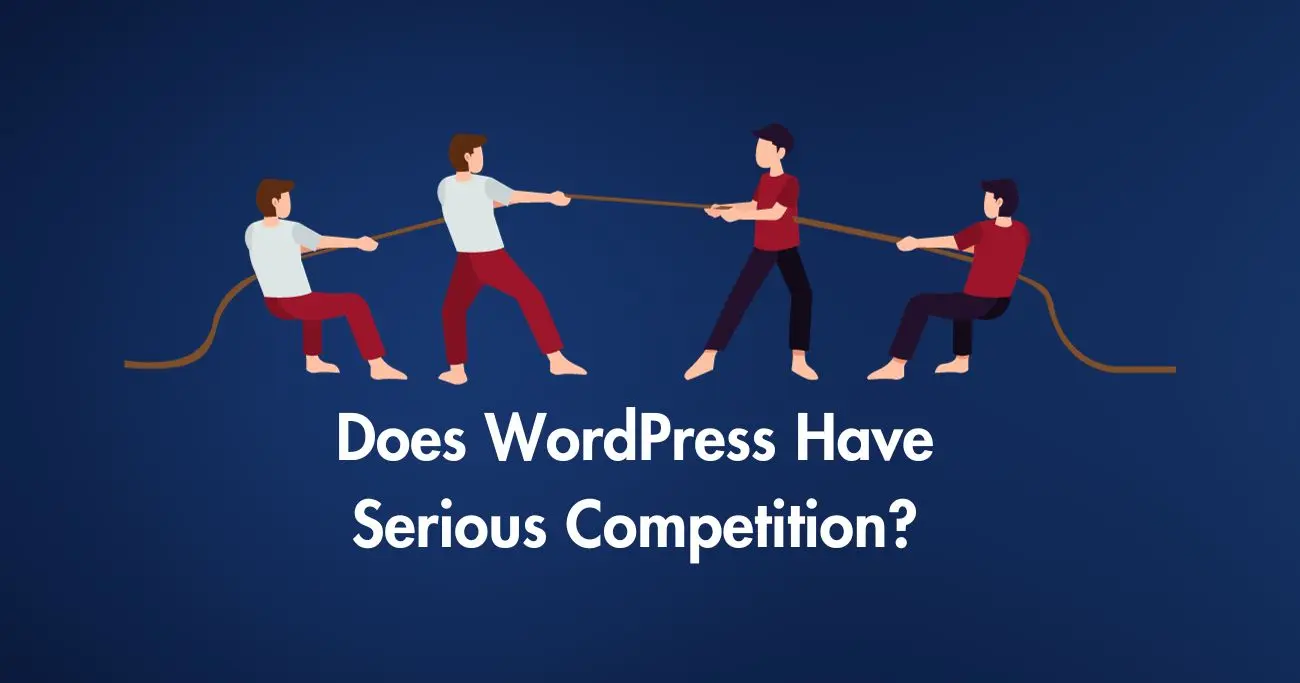
For any software, robust competition is healthy to prevent stagnation. Some alternatives exist in the CMS space, but none match WordPress’ scale currently. Let’s examine major competitors:
Drupal
Drupal focuses more on advanced users, security, and enterprise needs. It has a steeper learning curve so hasn’t gained much traction for simpler sites.
Joomla
Joomla once competed neck-to-neck with WordPress but has lost significant market share now. The UI is less intuitive and the extensions ecosystem is smaller.
Wix / Squarespace
These are closed-source online site builders. They sacrifice flexibility for ease of use. Not viable for advanced custom sites.
Webflow
Webflow is gaining traction for its visual designer but still has limitations in features and extensibility.
Open-source CMSes like Drupal may yet disrupt WordPress but unlikely in the near term. Closed-source site builders serve a different audience than advanced WordPress users.
In summary – WordPress dominates the CMS space with no serious threat currently. But continued innovation is vital to maintain the edge.
Will Page Builders Replace WordPress?
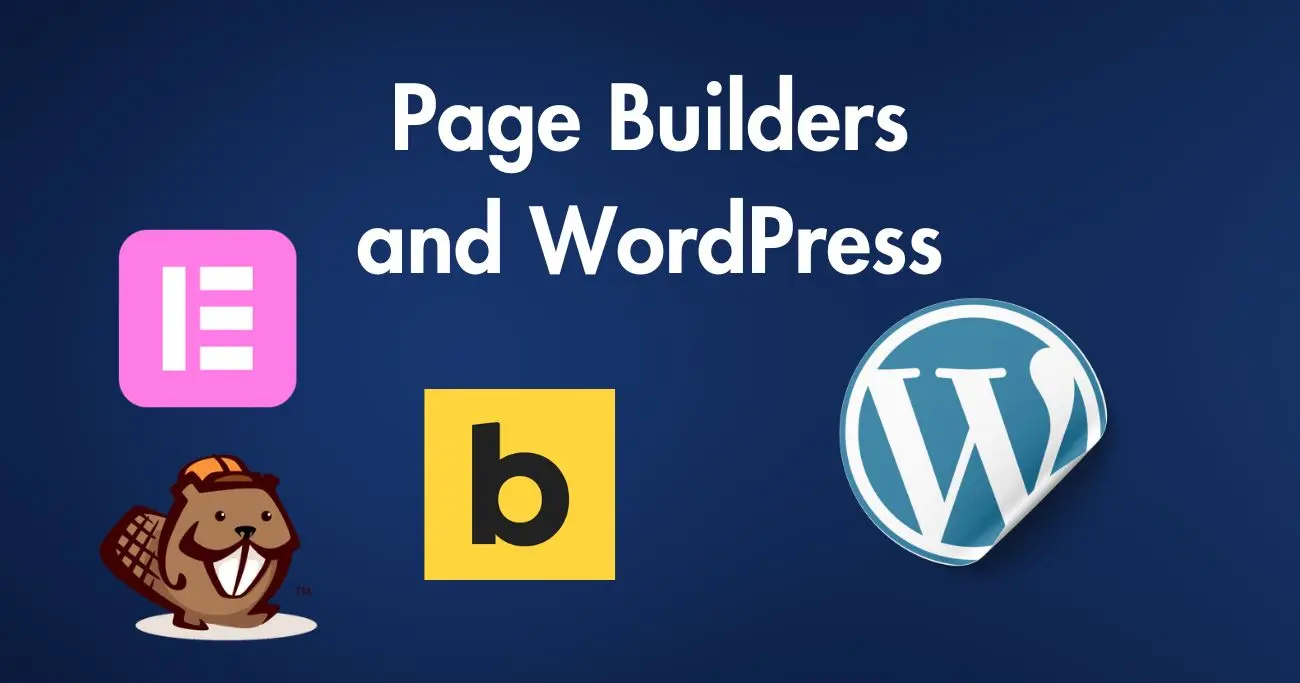
Some speculate page builders with drag-and-drop interfaces like Elementor, Bricks, Beaver Builder, Brizy, etc can make WordPress redundant. Why tweak PHP and code when you can visually build pages?
While appealing, page builders currently still depend deeply on WordPress:
- They install as WordPress plugins and themes and integrate tightly with its ecosystem.
- They utilize WordPress’ core content management features.
- Switching page builders or disabling them can break site functionality.
- Many things like SEO settings, security, performance, etc. still depend on the CMS.
Migrating away from WordPress requires rebuilding the entire site from scratch. So page builders solve the front-end site-building aspect but are not independent of WordPress itself. They enhance the CMS rather than replacing it.
Page builders are also limited for advanced customization needs compared to coding directly in WordPress. Their main appeal is speed of development and user-friendliness.
So while page builders will continue gaining popularity, they seem unlikely to make WordPress obsolete. Most users will benefit from blending flexible WordPress backend with intuitive visual frontends.
Will WordPress Remain Free and Open Source?

A key appeal of WordPress is its open source nature allowing anyone to freely modify, extend and reuse the software. But some wonder if its commercial success may lead to a future where:
- WordPress becomes closed source and paid
- Core features get stripped out into paid add-ons
- Support and updates require a commercial license
While the above is hypothetically possible, WordPress has reiterated its commitment to open source multiple times. Their business model revolves around commercial partnerships, paid support/hosting and ecosystem services – not charging for core software.
Modifying WordPress to a closed source or freemium model risks alienating and destroying its community, killing its adoption and giving competing open source CMSes a chance to thrive.
So commercial interests seem aligned with keeping WordPress free, decentralized, and open. It seems highly unlikely the core software will become paid or crippled in the future.
What Does the Future Hold for WordPress?

Given its continued dominance, WordPress seems poised to power the web for the foreseeable future. Some potential things to expect:
- Ever improving admin interface and user experience.
- Tighter integration between WordPress backend and frontend page builders.
- Block-based editors becoming the default experience across sites.
- Growth of services like WordPress VIP providing enterprise grade hosting and support.
- Automation solutions like AI site builders, chatbots etc. powered by WordPress.
- Improved performance and speeds driven by Full Site Editing and outside innovations.
- Enhanced security hardening to protect sites from emerging threats.
- Deeper ecosystem integrations – e.g. with React, GraphQL, Node apps etc.
- Growth in use of headless / decoupled WordPress architectures.
While the future is unpredictable, WordPress seems well positioned given its open source roots, constant innovation and vibrant community.
Barring a disruptive advancement in CMS technology, WordPress is poised to continue its dominance on the web for years to come.
Is WordPress Dying? The Verdict

Given the facts and analysis above, the verdict is clear – WordPress is far from dying. The open source CMS is going strong with no signs of losing steam.
Here’s a recap of the key points:
- WordPress powers over 43% of all websites, a number that continues to grow.
- No serious rival CMS has made a dent in its market share.
- Core open-source software will remain free and avoid the crippled “freemium” model.
- Page builders and other innovations enhance rather than replace WordPress.
- Continued improvements and community support cement its leading position.
However, WordPress cannot be complacent. Staying hungry, innovating rapidly, and enhancing weaknesses like security and performance will be vital.
But all signs point to WordPress remaining the dominant CMS for the web in 2024 and beyond. Concerns about it “dying” are exaggerated and not backed by facts.
The future remains bright for this powerful, flexible, and easy-to-use open source CMS.
Frequently Asked Questions

Here are some common FAQs about WordPress’ future prospects:
Is WordPress usage declining?
No, WordPress usage and market share continues growing steadily. It now powers over 43% of all websites.
What are the biggest threats to WordPress?
Main threats include performance issues, security vulnerabilities, competition from other CMSes and failure to innovate. But the core team is experienced at addressing these.
Can page builders replace WordPress?
Unlikely – page builders depend deeply on WordPress plugins and ecosystem. They enhance WordPress for front-end rather than replacing it.
Will WordPress core become closed source?
Extremely unlikely – WordPress has reiterated commitment to open source multiple times. Paid software goes against its community ethos.
Does WordPress have serious competition?
No major CMS rivals its market share currently. Others like Drupal cater to a narrower audience. But competition is healthy to prevent stagnation.
Will WordPress remain free in the future?
Yes, WordPress will almost certainly continue being free open source software. Paid licensing goes against its community and commercial interests.
What innovations will shape WordPress’ future?
Faster performance, block editors becoming default, deeper integrations, automated solutions and decoupled architectures may be focal points.
Conclusion
WordPress revolutionized web publishing and continues its dominance as CMS of choice. While facing some criticism in areas like performance and security, the core team is experienced at tackling these weaknesses.
With its vibrant ecosystem, constant evolution and commitment to open source – the future remains bright for WordPress. Page builders, AI solutions and other innovations will unlock even greater possibilities without replacing WordPress itself.
Barring an unforeseen disruption, WordPress is expected to power over 50% of all websites by 2025. The world’s most popular CMS is alive and kicking with no signs of being replaced anytime soon.
So for those wondering “is WordPress dying?” – the facts clearly debunk that myth. The platform is poised to continue its reign well into the future.

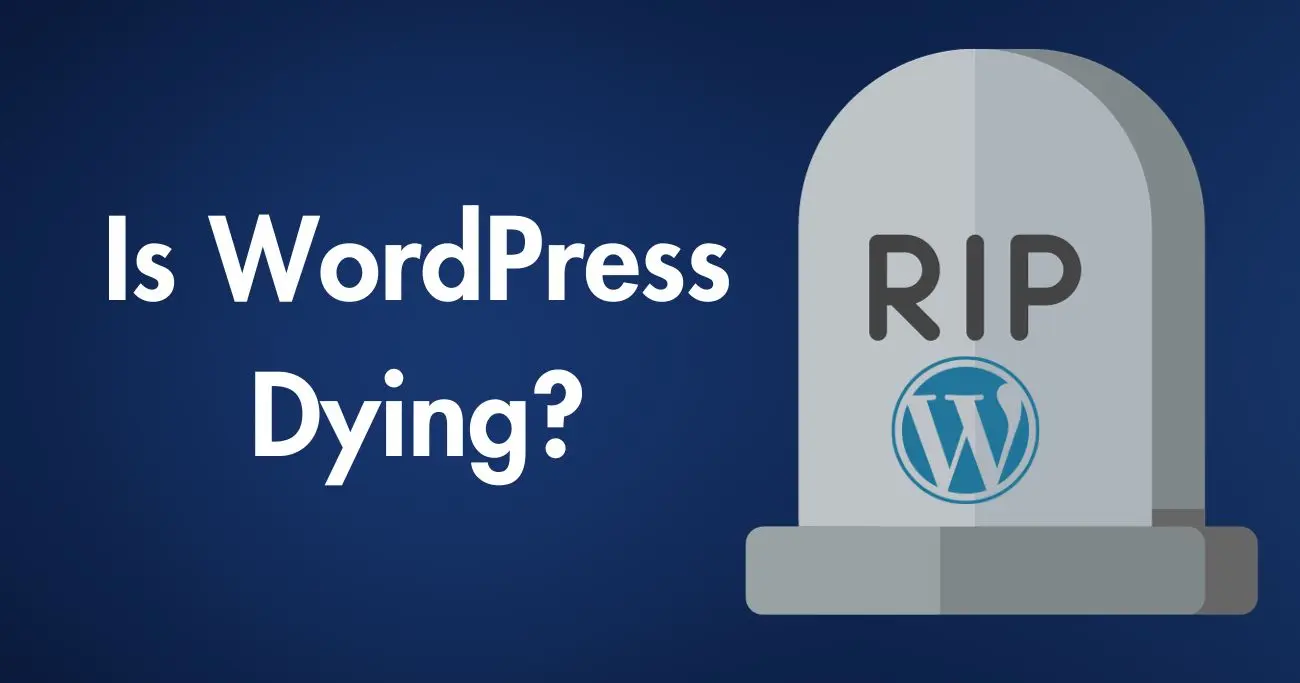
14 Responses
Thank you for your articles. They are very helpful to me. Can you help me with something?
Yes sure, please share your query
The articles you write help me a lot and I like the topic
Thank you for providing me with these article examples. May I ask you a question?
Yes, please ask
Thanks for your help and for writing this post. It’s been great.
Please provide me with more details on the topic
Hi, its fastidious article regarding media print, we all be aware
of media is a great source of data.
I enjoyed reading your piece and it provided me with a lot of value.
This is very interesting, You are a very skilled blogger. I’ve joined your feed and look forward to seeking more of your excellent post. Also, I have shared your site in my social networks!
Thanks for this excelent information. I’m going to recomended. Keep doing the great work.
I just could not leave your web site prior to suggesting that I actually loved the standard info an individual supply to your visitors? Is gonna be back incessantly in order to investigate cross-check new posts
I’m curious to find out what blog platform you happen to be using? I’m having some small security issues with my latest blog and I’d like to find something more safe. Do you have any recommendations?
I use WordPress as it’s the most widely used CMS